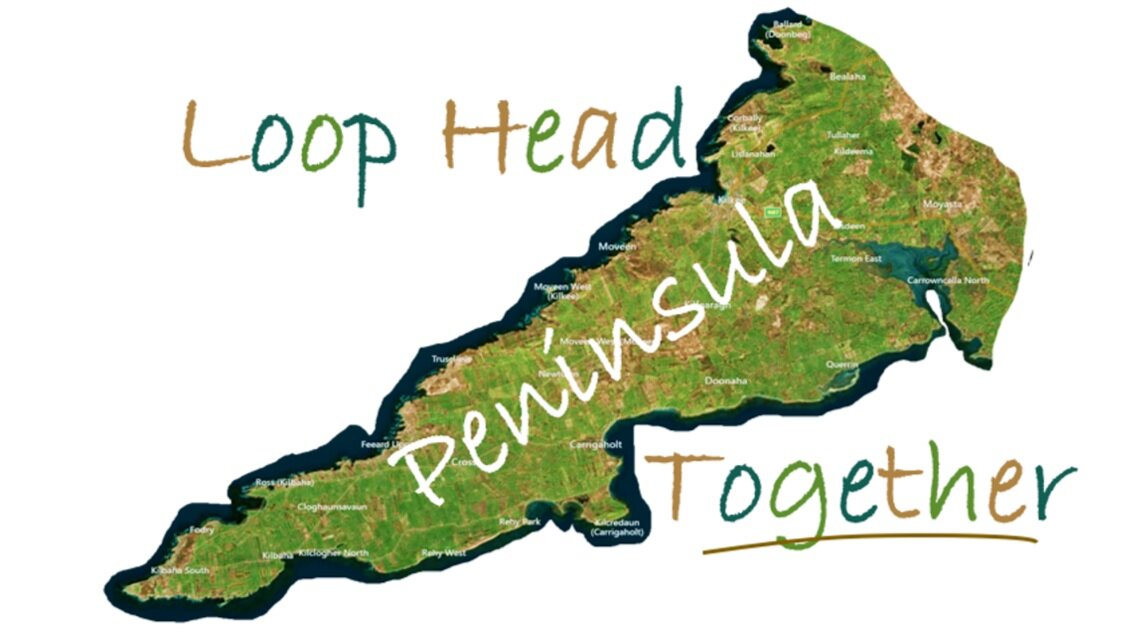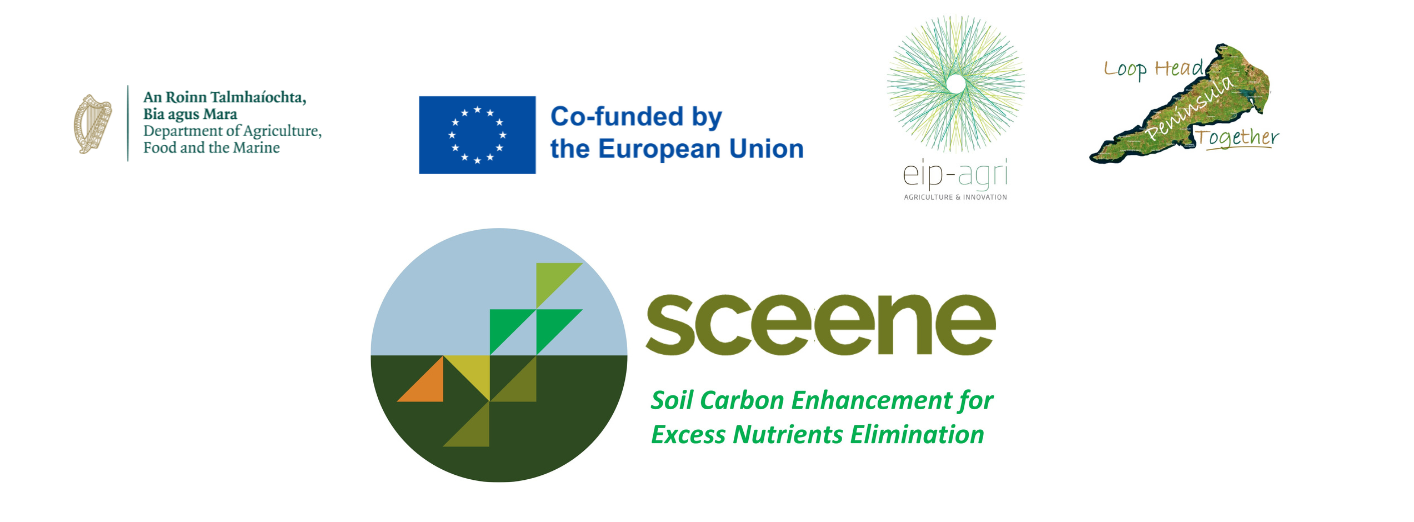SCEENE EIP Explained
Summary: The SCEENE EIP is a 4½ year project, based on the Loop Head peninsula, West Clare, but with wider applicability. It is focused on soil carbon enhancement, the reduction of nutrient run off, and saving on the need for chemical fertilisers, while trialling the potential for circular bio economy solutions. Farming in the Loop Head peninsula is characterised by shallow, rocky soils, and intensive dairy and livestock farming, which leads to surplus manure and nutrient runoff. This runoff has the potential to contaminate local waterbodies and wider catchments. It also contributes to soil degradation and greenhouse gas emissions. The EIP will develop a circular, community-led approach, that leverages technological innovation, and ecosystem-based strategies to tackle these issues. Central to this vision is the integration of biochar production, from local organic waste, and the use of mycorrhizal fungi, for use in the cultivation of carbon-sequestering crops. The SCEENE EIP is co-funded by the Department of Agriculture, Food and Marine and the European Union, with a budget of €1.75 million. Like similar EIPs, it will test new ideas and practices which can be used more widely by farmers and others to improve local ecosystems, farm sustainability, resource efficiency and productivity.
Lead Coordinator: Loop Head Together is the lead project partner and overall coordinator of the SCEENE EIP. Loop Head Together is a company limited by guarantee (CLG) based in West Clare. It acts in a coordinating capacity, as a grass roots initiative, supported by almost fifty local groups and organisations, across the Loop Head Peninsula in West Clare. As Project Lead for the SCEENE EIP, Loop Head Together CLG will be the main point of contact with the Department of Agriculture, Food and Marine (DAFM). It will lead and coordinate the implementation of the various work elements of the EIP and Chair EIP Operational Group. In addition, it will be responsible for all reporting and financial management, and will direct, oversee and coordinate project tasks across participant Loop Head farmers and coordinate the role of external contractors in a timely manner.
Who Is Involved: The SCEENE EIP includes numerous stakeholders including Loop Head Together, local farmers, experienced researchers, leading academics from the Technological University of the Shannon (TUS) and University College Dublin - with further expertise from MTU (Munster Technological University). It also includes Clare County Council, and others with extensive expertise in managing and delivering collaborative projects focused on soil health, nutrient management, circular agriculture and the circular bioeconomy, together with dissemination work, farmer to farmer, and community outreach.
SCEENE EIP Approach: The approach is centered on a community based, ecologically sustainable, circular farming system, that reduces environmental degradation, while creating long-term economic benefits. Delivery will take place across eight different work packages. Work will include the development of a biochar facility on the Loop Head peninsula, the development of biochar production and the formulation of fertilizer. It will include laboratory trials, and field trials, to fully analyse the interactions of biochar, field crops, and fungi. Field testing, of optimised inputs, will take place on the land of participating local farmers. The approach will focus on the mitigation of runoff, and undertake local catchment assessment work to monitor and quantify environmental impacts. The approach will also assess the economic and financial outcome of the work, and undertake comprehensive stakeholder engagement and training.
Operational Area: The EIP operational area is the Loop Head peninsula in West Clare. This area is also the designated decarbonizing zone in the recently adopted Climate Action Plan for County Clare. Selection was based on the socio-economic, physical, and environmental characteristics of the Loop Head peninsula. It is considered an appropriate demonstration area for rural decarbonisation measures to be adopted, and a demonstration area to highlight the potential for scaling up adoption across County Clare. The EIP will therefore, have wider relevance across County Clare and Ireland, and most especially in the coastal farming areas. The SCEENE EIP aims to address the environmental and agricultural sustainability challenges faced in such farming communities. Project delivery will ensure the work of the EIP, will be relevant across different farming systems.
Overall Aim: The project will develop a circular, community-led approach, that leverages technological innovation, and ecosystem-based strategies, to tackle key farming challenges. Central to this vision, is the integration of biochar production from local organic waste, the use of mycorrhizal fungi, and the cultivation of carbon-sequestering crops. The goal is to transform farm waste into a valuable soil amendment, while simultaneously improving soil health, enhancing local water quality and water retention, while optimising carbon sequestration, and building economic resilience in the local farming community.
Project Goals: The SCEENE EIP will deliver on the following specific goals:
Ø Nutrient Runoff Elimination: Use biochar and specific plants with long root systems to capture and store excess nutrients, preventing them from leaching into local waterbodies in the wider catchment.
Ø Soil Health Enhancement: Improve soil structure, porosity, and microbial biodiversity using biochar and mycorrhizal fungi, particularly in the poorly drained gley soils of the region.
Ø Carbon Sequestration: Use pyrolysis to lock carbon into biochar and integrate it into agricultural soils.
Ø Innovative Fertiliser Development: Produce and test biochar-based fertilisers tailored to local farm needs.
Ø Scalable Demonstration: Establish a demonstration facility and pyrolysis reactor to create replicable, decentralised systems viable for small and medium enterprises, including local SMEs.
Ø Community-Led Action Research: Embed local stakeholders into the decision-making and knowledge-sharing process to ensure local applicability and ownership of the deliverables of the SCEENE EIP.
Project Objectives: The SCEENE EIP will deliver the following project objectives:
Ø Develop a scalable model to enhance local soil health.
Ø Promote efficient nutrient management across the Loop Head peninsula.
Ø Foster a collective farming approach to soil health and regenerative agriculture.
Ø Create a circular farming system, diversifying farmer incomes, in a circular bioeconomy approach.
Ø Enhance wider soil literacy in agriculture and especially in the coastal farming regions of Ireland.
Start Date & Timeframe: The SCEENE EIP got underway on the 1st July 2025 and will have a 4½ year (54-month) implementation timeframe, ending late December, 2029.
Budget: The overall approved budget from the DAFM is €1.75 million, to be used across eight different work packages. Of this, an amount of €645,000 will be assigned to equipment and consumables related to implementation, including farmer payments. An amount of €809,000 will be assigned to project coordination, project management and administration, research, monitoring, data collection and analysis, and on external support. In addition, approximately €280,000 will be allocated to other elements of project implementation.
More Information & To Stay Connected: If you would like more information on the work of the SCEENE EIP or if you wish to stay in touch and stay connected, then please email sceeneeip@gmail.com -
Note: The projects website (www.sceene-eip.ie) is not yet live and other social media channels are currently under development.


